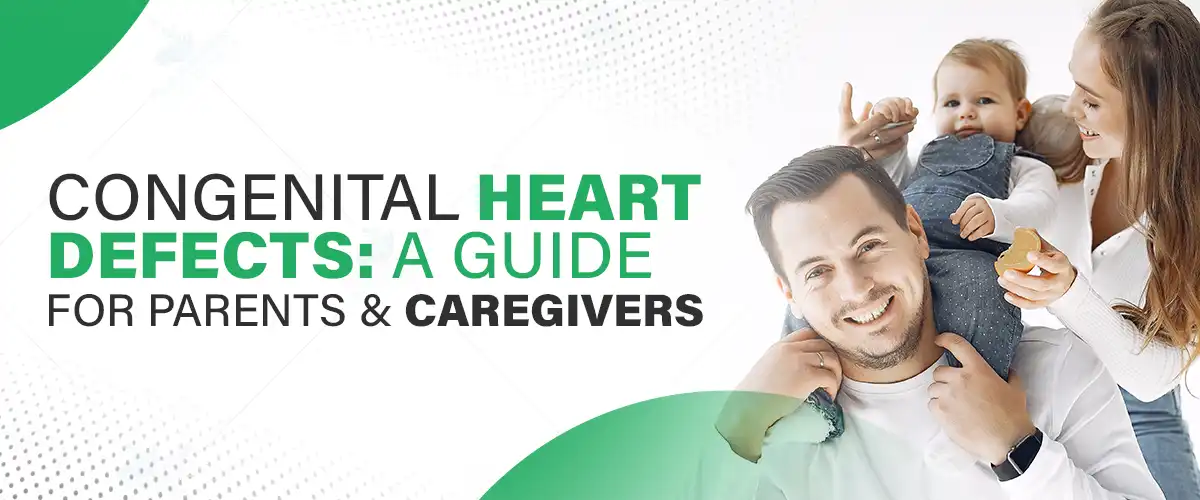
Subscribe to our

Congenital Heart Defects (CHDs) refer to structural abnormalities in the heart that are present at birth. These defects can range from mild to severe and may affect the heart’s ability to pump blood efficiently. CHDs are among the most common birth defects and can impact a child’s overall health and development.
Early detection, timely treatment, and continuous medical care play a crucial role in managing CHDs effectively. Various hospitals specializing in congenital heart defects treatment in Noida offer expert care to help children lead healthier lives. Parents and caregivers play an essential role in supporting their child’s heart health through regular medical check-ups, lifestyle modifications, and emotional support.
Contact us today at +91 9667064100 to discuss the best treatment plans for congenital heart defects and give your child a healthier future.
CHDs are abnormalities in the structure of the heart or major blood vessels that develop during fetal growth. They can disrupt the normal flow of blood through the heart, affecting oxygen supply to the body. While some defects are mild and require minimal intervention, others may necessitate immediate medical attention or surgery.
CHDs are classified into two main categories:
CHDs may result from a combination of genetic and environmental factors, including:
Early detection of CHDs during pregnancy allows for better planning and management. Prenatal tests include:
After birth, symptoms such as bluish skin, breathing difficulties, and poor feeding may indicate a CHD. Diagnostic tests include:
Certain CHDs can be managed with medications to improve heart function, control symptoms, and prevent complications. Common treatments include:
In rare cases where other treatments fail, a heart transplant may be necessary.
Parents and caregivers may experience anxiety and stress. Seeking counseling and joining support groups can help manage emotional challenges.
Parents should seek immediate medical attention if their child experiences:
Innovations in Surgery & Non-Surgical Interventions
Improving Life Expectancy & Quality of Life
Felix Hospital is a leading center for Congenital Heart Defect (CHD) Treatment in Noida, offering world-class care for children and adults with congenital heart conditions. Our expert cardiologists specialize in early diagnosis, advanced interventions, and lifelong management of CHDs.
At Felix Hospital, the Best Heart Hospital in Noida, we provide cutting-edge treatments, including catheter-based procedures, pediatric cardiac surgery, and lifelong CHD care to ensure the best outcomes for our patients.
Schedule an appointment with the best cardiologists in Noida at Felix Hospital and ensure the best heart care for your child. Call now or book online!
Parents and caregivers should remember that CHD management is possible with proper medical care and lifestyle adjustments. Early diagnosis, timely intervention, and ongoing follow-ups can significantly improve a child’s quality of life. If you are considering congenital heart defect surgery in Noida, consult with a specialist to explore the best treatment options available.
By staying informed and proactive, you can ensure your child gets the necessary care for a healthier future.
Q- Can a child with CHD participate in sports or physical activities?
Ans- While mild CHDs may not limit a child’s activity, certain heart defects require activity modifications. A pediatric cardiologist can help determine safe exercise levels based on the child’s condition.
Q- Are congenital heart defects always detected before birth?
Ans- No, while fetal echocardiography can detect many CHDs during pregnancy, some mild defects may go unnoticed until after birth or even later in childhood when symptoms appear.
Q- Can CHDs be completely cured, or do they require lifelong management?
Ans- Some CHDs can be corrected with surgery or minimally invasive procedures, while others may require lifelong monitoring, medications, or additional interventions as the child grows.
Q- Is there a genetic test available to determine if my child is at risk for CHD?
Ans- Genetic testing can help identify chromosomal abnormalities linked to CHDs, such as Down syndrome, but most CHDs occur due to a combination of genetic and environmental factors.
Q- What are the feeding challenges for infants with CHDs, and how can they be managed?
Ans- Babies with CHDs may have difficulty feeding due to fatigue or breathing issues. Special feeding techniques, high-calorie formulas, or tube feeding may be recommended to ensure proper nutrition.
Q- Do all children with CHDs need surgery, or are there non-surgical treatment options?
Ans- Not all CHDs require surgery. Some can be managed with medications, lifestyle modifications, or catheter-based interventions, which are less invasive than open-heart surgery.
Q- How does a congenital heart defect affect a child’s growth and development?
Ans- Some children with CHDs may experience delayed growth due to reduced oxygen levels or feeding difficulties. Regular follow-ups with a cardiologist and proper nutrition can help manage these concerns.